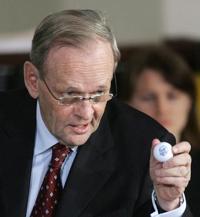OTTAWA - Eight years.
That's how long Conservative Leader Pierre Poilievre says it has been since Prime Minister Justin Trudeau won power in October 2015 — a length of time he is weaponizing as the Tories' latest line of attack against the Liberal government.
As the House of Commons resumed sitting Monday, both leaders were fresh off meetings with their respective caucuses, where they charted out their priorities for the months ahead following a holiday break.
Although Trudeau and Poilievre do not agree on much, each cited affordability as a top concern, heeding economists' warnings that Canada could be headed toward a recession at a time when prices on goods like groceries are already high.
Such was the backdrop for Monday's question period, which Poilievre led by pressing Trudeau on his spending decisions — particularly the amount his government has paid in contracts awarded to consulting firm McKinsey and Company, which is under scrutiny at a parliamentary committee.
Trudeau defended his government's record on social programs such as national daycare and said all MPs "know well that ºÚÁϳԹÏÍøs are facing tough times."
Instead of offering "real solutions," the prime minister charged, Poilievre "stands up, crosses his arms, throws up his hands and says, 'everything is broken.'"
Trudeau also faced questions Monday from the New Democrats on his commitment to publicly-funded health care, after he touted Ontario Premier Doug Ford's plan to allow more publicly-funded surgeries in private clinics as an innovative solution.
Saying that this meant Trudeau was flip-flopping on a position he took during the 2021 federal election campaign, NDP Leader Jagmeet Singh called on the House of Commons to have an emergency debate on privatization in health-care. The Speaker denied that request.
Singh told reporters that he was set to discuss the issue of private health care with Trudeau on Monday afternoon, as the prime minister prepares to host premiers for negotiations on federal health transfers.
Singh and Trudeau are meant to meet regularly under the supply-and-confidence agreement signed last March, a deal in which the NDP agreed to support the governing Liberals on key votes in exchange for movement on priorities such as federal dental care.
A new health-care funding deal is a big-ticket item for the governing Liberals in the weeks ahead, as is their proposed legislation on banning handguns and models of what are defined as "assault-style" weapons.
The legislation has been met with backlash from the Opposition Conservatives, as well as many firearms owners and First Nations hunters who say the bill would ban commonly used hunting rifles.
Conservatives say the Liberal government's approach to gun violence and crime overall is failing.
On Monday, Melissa Lantsman, one of the party's two deputy leaders, called on the House to hold an emergency debate on the recent violence seen on board Toronto's subway system. The Speaker also denied that request.
To kick off its 2023 legislative agenda, the government began the sitting with a debate on Bill C-35, which was tabled last December.
Families Minister Karina Gould said the bill seeks to enshrine the Liberals' national daycare plan into law — and commit Ottawa to maintaining long-term funding, making it harder for a future government to undo.
Ottawa has inked deals with provinces and territories in an effort to cut fees down to an average of $10 per day by 2026.
Gould called on all parties to support the bill during Monday's debate, saying the national plan has begun saving families money at a time when finances are tight.
But Conservative MP Michelle Ferreri said the plan is "subsidizing the wealthy" while failing to reduce wait times for child-care spaces and address labour shortages in the sector.
Ferreri said Conservatives would be presenting "strong amendments" to the legislation, which she slammed as nothing more than a "marketing plan."
"Conservatives believe in equal choice, freedom of choice for quality, affordable child care," she said.
Ferreri argued private daycare providers must continue to play a role in the system, given how many employee women and operate in rural areas.
As the bill stands before Parliament, it is unclear what Poilievre's position is when it comes to the existing agreements between the federal government and provinces surrounding child care.
The plan, however, has the NDP's support — and it appears the Conservatives won't.
Asked Monday whether there were any areas he believes the NDP could work with the Conservatives on, Singh said: "No."
This report by ºÚÁϳԹÏÍø was first published Jan. 30, 2023.
— With files from Mickey Djuric.








































